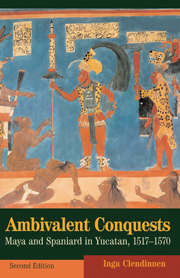Book contents
- Frontmatter
- Contents
- List of illustrations
- Preface to the second edition
- Preface to the first edition
- Acknowledgments
- Map I Yucatan in the conquest period
- Part I Spaniards
- Part II Indians
- 9 Finding out
- 10 Connections
- 11 Continuities
- 12 Assent
- Epilogue: Confusion of tongues
- Appendix: A sampler of documents
- Glossary of Spanish and Maya terms
- Notes
- Select bibliography
- Index
12 - Assent
Published online by Cambridge University Press: 05 October 2013
- Frontmatter
- Contents
- List of illustrations
- Preface to the second edition
- Preface to the first edition
- Acknowledgments
- Map I Yucatan in the conquest period
- Part I Spaniards
- Part II Indians
- 9 Finding out
- 10 Connections
- 11 Continuities
- 12 Assent
- Epilogue: Confusion of tongues
- Appendix: A sampler of documents
- Glossary of Spanish and Maya terms
- Notes
- Select bibliography
- Index
Summary
It is most necessary to believe this. These are the precious stones which our Lord, the Father, has abandoned. This was his first repast, this balche, with which we, the ruling men revere him here. Very rightly they worshipped as true gods these precious stones, when the true God was established, our Lord God, the Lord of heaven and earth, the true God. Nevertheless, the first gods were perishable gods. Their worship came to its inevitable end. They lost their efficacy by the benediction of the Lord of Heaven, after the redemption of the world was accomplished, after the resurrection of the true God, the true Dios, when he blessed heaven and earth. Then was your worship abolished, Maya men. Turn away your hearts from your old religion.
The Book of Chilam Balam of Chumayel
I have suggested how their shared understanding of the past enabled the Maya to confront a dangerous present and a problematical future with something close to equanimity, and to experience subjugation without relinquishing their sense of autonomy. The Books of Chilam Balam were not only products of that stance, but also crucial vehicles for its maintenance. López Medel had noted in 1552 how obstinately the Maya lords continued to call their people together for secret meetings for the worship of their idols and the celebration of their histories, and that same complaint echoed down through the century and beyond.
- Type
- Chapter
- Information
- Ambivalent ConquestsMaya and Spaniard in Yucatan, 1517–1570, pp. 161 - 189Publisher: Cambridge University PressPrint publication year: 2003

